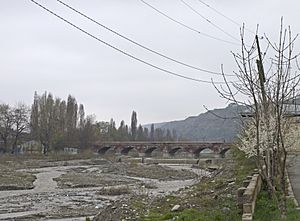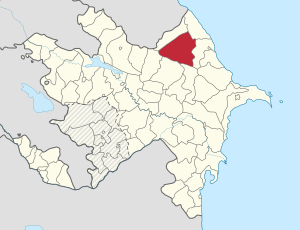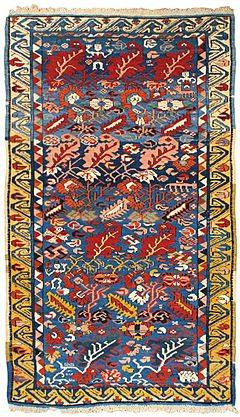Quba District (Azerbaijan) facts for kids
Quick facts for kids
Quba
|
|
|---|---|
| Azerbaijani: Quba rayonu | |

The arch bridge over the Qudyalçay connecting Quba (left) and Qırmızı Qəsəbə (right)
|
|

Map of Azerbaijan showing Quba Rayon
|
|
| Country | |
| Capital | Quba |
| Area | |
| • Total | 2,610 km2 (1,010 sq mi) |
| Population
(2018)
|
|
| • Total | 170,000 |
| • Density | 65.1/km2 (169/sq mi) |
| Time zone | UTC+4 (AZT) |
| Postal code |
4000
|
| Telephone code | (+994) 23 |
Quba is a special area, called a rayon, located in the northeastern part of Azerbaijan. The main city of this area is also called Quba. It sits right by the Qudyal River.
This area around Quba is very fertile, meaning it's great for growing things. It's especially famous for its delicious apples. The city of Quba itself is also well-known for making beautiful, high-quality carpets.
Contents
Discover Quba: A City in Azerbaijan
Quba became very important in the 1700s. In 1747, a powerful ruler named Nader Shah from the Persian Empire was killed. After this, Hussein-Ali, who was in charge of the region, decided to try and unite the different local areas, called khanates, into one independent kingdom.
Quba's Rich History
One of Hussein-Ali's first big decisions was to move his capital city. He chose Quba because it was easier to defend than his old capital, Xudat. He built a strong fortress there. Hussein-Ali passed away in 1757, but his son, Fatali Khan, continued to expand the kingdom. Quba became very wealthy because it was the capital city. You can still see some old ruins from this time, like Çirax Qala, on the way to Baku.
From Capital to Quiet Town
However, when Fatali Khan died in 1789, Quba's luck began to change. In 1806, the area was taken over by the Russian Empire. Because of this, Quba became less important in the history and politics of Azerbaijan.
Today, Quba city has several old and interesting buildings. These include the Juma Mosque (also known as the Friday Mosque), the Ardabil Mosque, and an old public bathhouse called a hamman. The region is also home to the largest group of Mountain Jews in Azerbaijan. They live in a community called Qırmızı Qəsəbə, which means "Red Town," located just across the river from Quba City.
Farming and Fun: Quba's Apples
The Quba region has been famous for its amazing fruit gardens for a long time, even since the Soviet era. According to official reports, the apple orchards in the Quba-Khachmaz area cover almost 22,000 hectares. A huge part of this, about 14,000 hectares, is right here in the Quba district.
The Annual Apple Festival
Since 2012, Quba has held an exciting Apple Festival every year. At this festival, you can see amazing displays, traditional dances, and many different kinds of apples. There are also sweets and drinks made from apples. Gardeners even compete in fun challenges at the "Apple Festival."
Exploring Quba's Old Buildings
Ancient Quba is home to at least 134 historical and archaeological sites. These include an old temple for Fire-worshippers near Khynalyg village. There are also tombs in Aghbil village that are from the 1500s. The Mosques Sakinekhanum, Hadjy Djafar, and Djuma in Quba were built in the 1800s. You can also visit the Gumbezli bath house.
In the district, there is a statue of an important official named A.A. Bakikhanov. You can also find a statue of the poet Samed Vurghun. There is also a statue of a Soldier, which honors the people who died in the Great Patriotic War.
Images for kids
See also
 In Spanish: Raión de Quba para niños
In Spanish: Raión de Quba para niños
 | Bayard Rustin |
 | Jeannette Carter |
 | Jeremiah A. Brown |










